The race to the first page of search results in recent times has been nothing short of cut-throat competition.
The plethora of categories struggling to leave an indelible mark on the first pages has made it fundamental for categories, especially Software as a Service (SaaS) to find ways to solve this issue of ‘identity crisis’ in this digital era.
You might be caught off-guard by this fact, but the market for software as a service (SaaS) is expected to reach US$195 Billion by the end of 2023.
Therefore, to help SaaS businesses in such a critical state of affairs and improve their ranking, requires systematic planning and strategy which is quite possible through Search Engine Optimization.
Now, you may wonder, Is SEO important for SaaS?

It’s a BIG ‘YES’ from our side, not because of any hidden marketing agenda, but owing to the majority of data, facts, and figures, which primarily echoes the SEO for SaaS significance.
For SaaS businesses, search engine optimization (SEO) has proven to be a fundamental component of digital marketing strategy.
Given that over 75% of all clicks to SaaS businesses originate from organic searches, SEO is the most important avenue for it to attract new customers.
And, have a better placement of itself in search engine results pages (SERPs) to increase the concerned website’s exposure and traffic.
This article will act as a Complete SaaS SEO guide explain why SEO is so crucial for SaaS companies, and further provide actionable advice for increasing your website’s visibility and attracting more customers.
But, first, let’s understand the problems SaaS encounters in this digital age or age of information.
What are the Major Problems faced by SaaS Companies in this Digital Era?
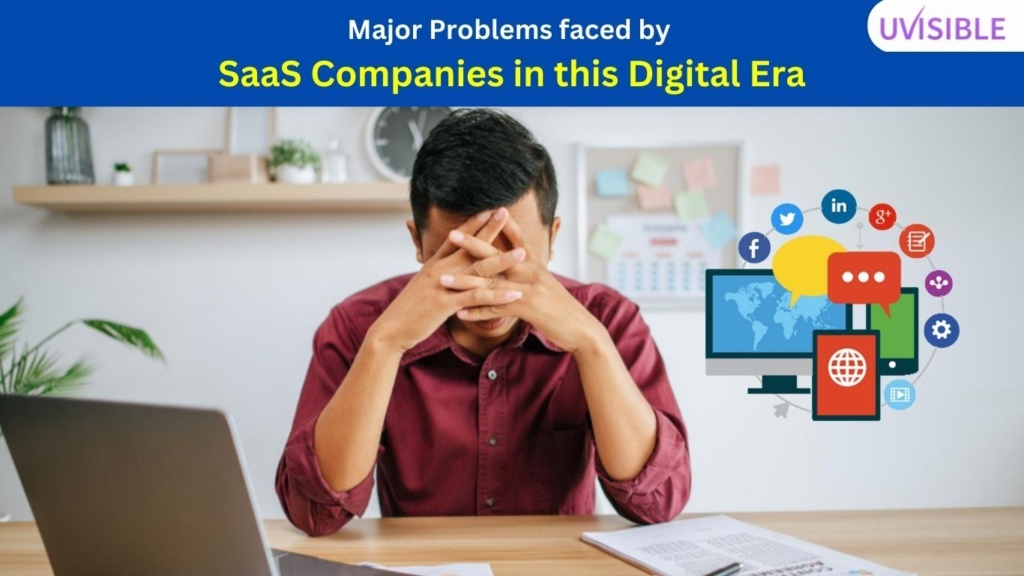
In this rigorously competitive digital era, the hindrances faced by SaaS businesses are pretty varied.
They have to tussle for customer acquisition, usability, data security, system integration, scalability, pricing, value proposition, and also keeping up with technological developments. Some of the major challenges have been discussed here:
Scaling up in a Digital World
If they seriously want to keep up with the needs of their expanding client base, they have to be able to rapidly expand their resources.
As we mentioned at the outset, it is difficult for SaaS companies to grow their businesses to a point where they can comfortably cover the expense of hosting their cloud apps or software.
Total cost of ownership (TCO) reduction requires that SaaS providers implement an efficient network architecture that:
- Find ways to attract new clients consistently.
- Preserves the current ones.
- Encourages users to connect and interact with one another through the program. resulting in a functional network.
While adding to the overall cost of this approach, the use of paid advertising will only attract new clients from within the target demographic.
What is required instead is a dedicated approach by a SaaS SEO Agency that gradually raises brand awareness across all digital avenues.
Maintaining Quality in the Digital Age
Self-service, managed-service, and automated-service models are just a few of SaaS companies’ many customer support options.
The cost of managing and sustaining SaaS systems is directly related to the types of support packages they offer.
A controlled or automated approach for troubleshooting has the potential to be used as good marketing collateral.
On the other hand, if your SaaS platform has a steep learning curve and you rely on a self-service model for customer support, you may need to spend a lot on tutorials and other instructional resources to help customers or clients get up to speed.
Balancing Customer Acquisition and Retention Strategies
Attracting and maintaining clients may be difficult for SaaS firms, especially in a saturated industry.
To expand your network as a SaaS provider, client acquisition and retention become the two of the most crucial strategies to focus on.
Whether your company strategy is based on a one-time payment or a recurring subscription, it is essential to innovate often with new goods, regular updates, and consistent customer support to sustain healthy growth.
This is why SaaS businesses need to put resources into a comprehensive marketing plan involving SEO Services that can bring in both new and returning clients.
Competing for Branded Keywords
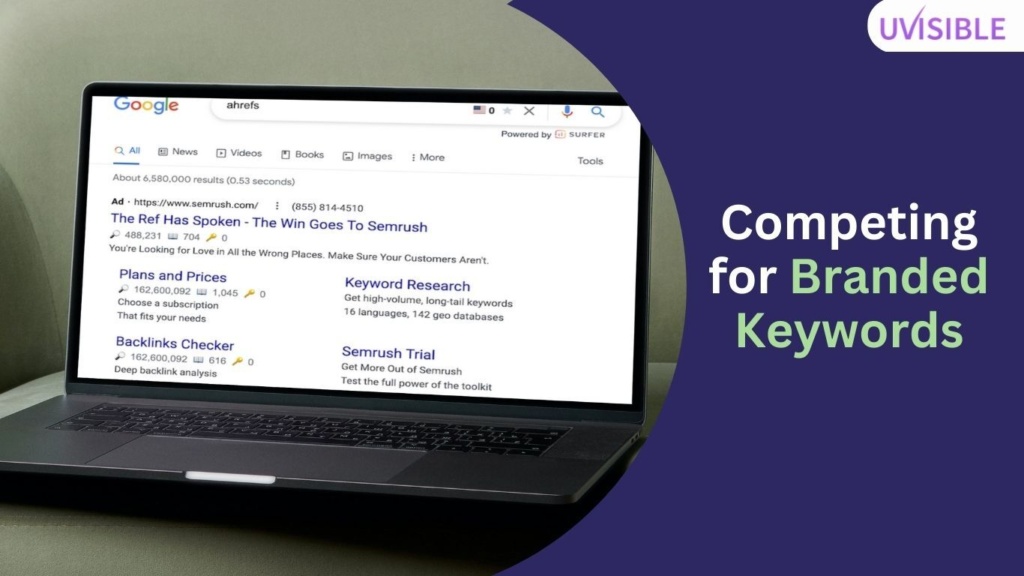
If nobody knows about your SaaS app or company, it will be hard to expand, especially if most of your keywords are brand names.
This is why it’s so important to use paid advertising, link building, and premium content to expand awareness of your company and strengthen consumer loyalty.
Catering to the Search Intent of Your Target Audience
Determining search intent can indeed be challenging for SaaS businesses, especially when dealing with branded items and a variety of keywords.
This difficulty often contributes to low rankings.
To enhance your ranking, it’s essential to ensure that your content aligns with what Google’s users are searching for.
If Google tends to favor landing pages for a particular keyword, then crafting landing pages is the way to go. Conversely, if Google prefers list-style content, then creating listicles is the right approach.
Adapting your content and following this SaaS SEO guide will aid you in matching the user’s intent, and increasing the likelihood of achieving higher rankings.
Ensuring Better UX
It is essential for software as a service (SaaS) companies to provide their customers with a streamlined and pleasurable user experience since the user experience directly influences the level of customer happiness and loyalty.
Pricing and Value Structure
In this highly saturated and competitive market, SaaS companies must find the right balance between pricing and the value their products provide to customers.
Adjusting to New Forms of Technology
Technology is always progressing, therefore SaaS businesses must be flexible enough to keep up with the latest advancements and industry trends.
Especially, given the advent of the latest SEO tools and SEO article writing software, SaaS companies need to be on their toes when using them as they can aid in rapid online visibility and higher search engine rankings.
SEO for SaaS: Key to Unlocking your Marketing Potential and Expanding your Online Reach
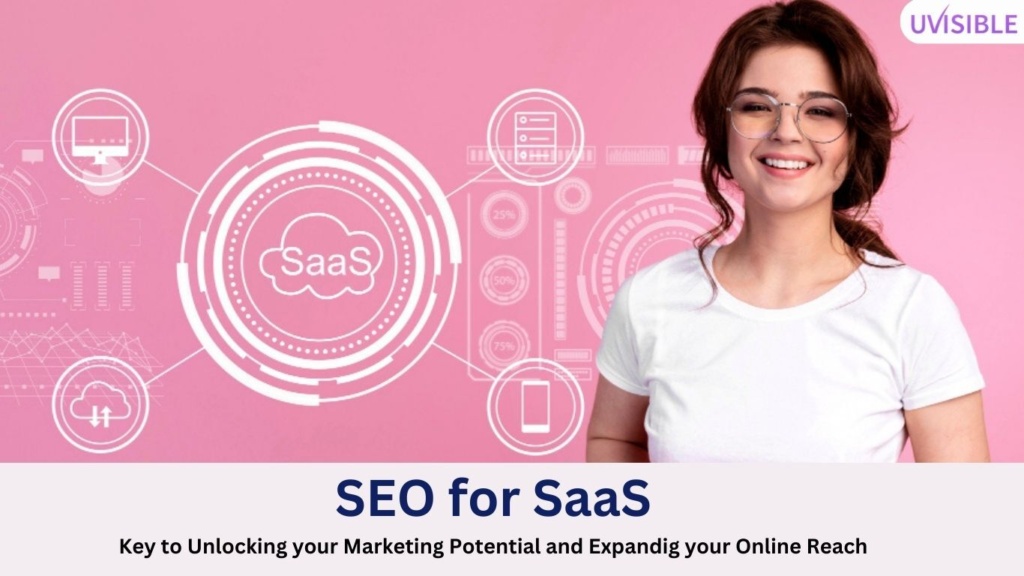
What is SaaS SEO? Is it Different from Normal SEO?
SaaS SEO is increasing organic traffic to a SaaS (Software as a Service) company’s website by achieving top rankings on search engine results pages (SERPs) for a set of relevant keywords.
Many SaaS companies usually prefer PPC Services to run their ad campaigns to quickly scale and acquire new clients.
However, many people are quickly realising that the costs of doing so are rising and that relying solely on the paid acquisition can be detrimental.
Because, as soon as the constant supply of funds to your ad campaigns stops, so do your traffic and leads.
That is why a solid SaaS SEO strategy is essential.
SEO can generate consistent traffic as well as exponential organic growth.
Many SaaS companies are increasing their channel investment to diversify traffic sources and keep acquisition costs sustainable.
Typically, SaaS SEO entails increasing a platform’s organic search visibility to put it in front of customers who are:
- Want to gain information about your software
- Showing a buying intent toward your software
- Want some answers to their queries through content and software
When it comes to SaaS companies, it’s fundamental to understand that SEO for SaaS strategy centered on providing exceptional content that answers a user’s search query and naturally generates backlinks is required to promote or push the sales of the concerned service.
Here are some pivotal reasons that will highlight SEO’s Significance for SaaS and also aid in harnessing White Label SEO Services for the added impact,
Driving Traffic to New Heights

SEO may assist SaaS businesses in driving more relevant traffic to their website, boosting the likelihood of generating leads and revenue.
And, one way to do this is by creating evergreen or non-time-sensitive content.
SEO driven by the creation of evergreen content leads in your SaaS company’s exponential development.
Evergreen content remains relevant to users over time if it is updated. For example, advice, How-to tutorials, service or product reviews, etc.
Evergreen content maintains the audience’s attention by providing new content pieces regularly. By putting the correct content in place, you can encounter skyrocketing traffic.
Steps for Generating Content
- Aim for Valuable content and its concentration must be on topically related keywords.
- The next step is to advertise this content piece to develop and grow organic traffic.
- Then, leverage the data obtained from the initial launch to improve further optimization, hence spurring new growth.
Maximizing Customer Acquisition while Minimizing Costs
You would be surprised to know that Customer Acquisition of Cost (CAC) through paid media has increased by 40% over the previous five years, meaning that the cost of customer acquisition through PPC can no longer be a sustainable marketing strategy.
In contrast, search engine optimization (SEO) is a highly cost-effective digital marketing strategy that keeps bringing in customers even if you cut back on your SEO spending for a while.
Thus, investing in SEO for SaaS is quite lucrative as its return on investment is significantly better and it also aims at brand exposure and attracting qualified visitors.
Gives Competitive Advantage
As more businesses use SaaS, larger corporations will encounter less competition in a variety of business areas.
According to various marketing specialists, small SaaS businesses with limited investment in result-oriented SEO capabilities will be unable to compete with established SaaS corporate platforms.
Thus, implementing a successful SEO strategy may provide SaaS firms with a competitive edge, allowing them to stand out in the congested SaaS market.
Turning Prospects into Paying Clients through Other Channels

SEO should never be used in isolation.
In reality, any SaaS SEO approach would require significant investment in content generation.
However, great material does more than just assist you in ranking for your desired keywords.
It may be employed in your social media marketing, email marketing, or even sponsored traffic.
Even with the correct promotion of your content, you can quickly generate referral traffic on your SaaS website.
This particular plan may help you drive and convert consumers from other marketing channels, which should be a primary justification element for your platform’s continued SEO investment.
Improved User Experience
Clients are always vital to any form of business as they are the ultimate source of revenue and play a fundamental part in reputation building and brand exposure.
For SaaS companies, it becomes essential to look after their client’s experience.
Therefore, SEO for SaaS firms primarily aims at improving the user experience on SaaS websites, allowing customers to locate what they are searching for and connect with the service more easily.
This can lead to increased client satisfaction and loyalty, which can lead to repeat business and positive reputation building.
Better ROI
SEO may help SaaS businesses get a greater return on investment than they would get from traditional forms of marketing since it improves visibility, drives relevant traffic, and boosts conversions.
Furthermore, careful implementation of SEO also aids in their development and success in the increasingly competitive digital marketplace.
SEO for SaaS Ranking Factors: Things to Remember while Optimizing the Website
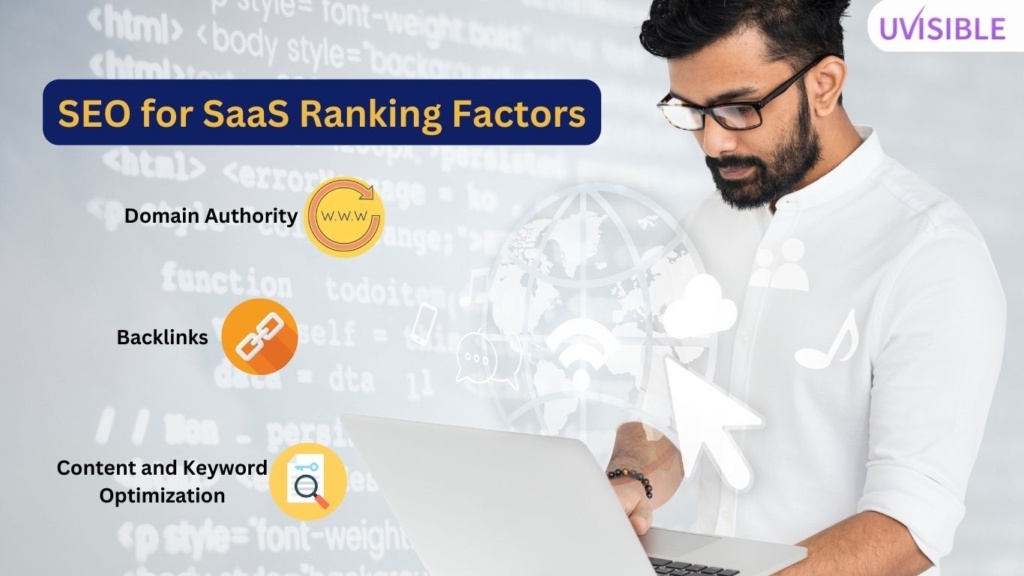
After discussing the problems for SaaS companies and the importance of SEO for SaaS, it’s time to take this SaaS SEO guide towards the SEO ranking factors.
Google ranks content using artificial intelligence algorithms. This AI system considers the freshness, relevancy, and usefulness of the source and pages.
These are the criteria used by search engines to evaluate a site’s importance and position in search results.
Some of the most weighted ranking factors are as follows:
Build Strong Links and Domain Authority
Competing on Google for SaaS-related keywords can be challenging without a strong link profile and high domain authority.
Quality links are paramount in this endeavor, focusing on relevance, traffic, and keywords that drive visitors to your site. Avoid link farms at all costs.
For SaaS SEO success, consider tactics such as guest posts, niche edits, and 3-way link exchanges.
Search engines evaluate your SaaS website by crawling your content to determine its industry relevance. Google places significant value on domain variables, including site age, authority, frequent fresh content publishing, backlinks, and more.
By prioritizing these aspects, you can improve your SaaS website’s visibility in search results and bolster your SaaS SEO efforts effectively.
Technical Structure
A lot of technological considerations are critical for SEO for SaaS, including website loading speed, security, site dependability, and responsiveness to mobile devices.
To improve your site’s visibility and rank in SERPs, your hired SaaS SEO agency should concentrate on boosting website performance, SEO optimization for image search, server response time, migrating to HTTP, and optimizing your URLs.
Content and Keyword Optimization
Your SaaS website’s success depends on high-quality, relevant, and distinctive content.
It helps to build your brand as an industry authority while also providing relevant information to your target audience.
In terms of Google’s algorithm and prospective users’ visits to your website, content is the most important ranking element.
The fundamental objective of SEO for SaaS must be to create content based on optimization including short-tail and long tail keywords.
Whereas, keyword optimization entails doing keyword research and targeting relevant keywords linked to your SaaS website.
This helps to drive more qualified traffic to your website by allowing visitors to find you when they search for similar keywords.
Backlinks
The backlinks profile shows how many relevant sites and domains connect to your website.
Domains with low domain ratings aren’t valuable in this context, therefore obtaining authority among respected websites that also use some SEO approach is required.
Search engines interpret them as “votes of confidence” and are extremely crucial for SaaS websites to build domain authority in the long run.
User Behavior
This ranking factor especially includes how visitors interact with a site and is measured by things like dwell time (how long someone stays on your site), clicks and interactions with your content, page views (the number of pages on your site that are viewed), what page visitors leave on and if they hit the back button or leave your site early.
Google thinks that the most important metric is how interested users are and how they find content.
The better the experience for users, the better the engagement.
This means that your content needs to be well-written and easy to find on Google.
A top-ranked site, for example, may be regarded as irrelevant if its CTR is insufficient.
Why Keyword Research and Content Strategy is Vital for SEO for SaaS?

The reason for discussing keyword research and content strategy separately in this SaaS SEO Guide is due to the base it provides to the entire SEO process.
Keyword research allows you to discover what terms and phrases your target audience is looking for, as well as the questions they are attempting to solve.
Understanding these phrases and subjects allows you to develop content that speaks directly to your audience and solves their requirements, increasing the likelihood that they will find your site through search engines.
Moreover, keyword research gives insight into the competition and assists you in determining what techniques they are using to rank for the keywords you are targeting.
This data is useful in building a content strategy that distinguishes your SaaS website from your competition and separates you from the market.
A solid content strategy prioritizes the creation of high-quality, relevant, and instructive material that engages and informs your audience, while also combining targeted keywords to boost search engine exposure.
According to marketing statistics, SaaS organizations utilizing an extensive content strategy see higher growth rates of 25 to 30%, retention rates that are 8 to 10% higher, and an incredible 500% ROI.
The material should also be user-friendly, with an emphasis on making it simple to locate, consume, and share.
By integrating keyword research and content planning, SaaS companies can provide a solid basis for their SEO operations, increasing traffic, improving ranks, and eventually driving more conversions.
Steps to Conduct a Detailed Keyword Research and Content Strategy
As a SaaS provider, you need to be quite serious and diligent with your keyword research and content strategy as it’s the ultimate SEO strategy that will maximize your traffic, leads, and sales.
You will probably need to make different content for different buyer personas as well as for new and current customers.
Buyer personas in this context refer to the prospective consumers’ demographic and psychographic factors consisting of their location, gender, interest, age, and so on.
When it comes to getting new customers, performing keyword research and making specific content for each step of your sales funnel will increase your chances of making a sale.
Thus, any SaaS company looking to hire an agency is required to keep in mind these particular SEO outsourcing tips for a higher success rate.
Pay attention to the Right Keywords
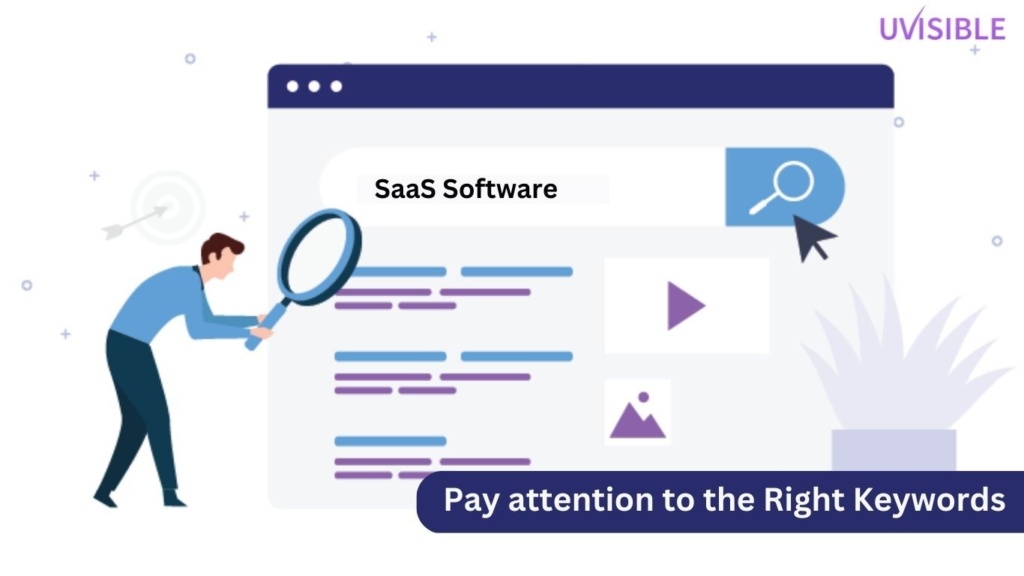
Early-stage SaaS providers have to pay a lot to get new customers, so it’s important to come up with a strategic organic keyword strategy that brings qualified traffic to your website.
Some ways to come up with high-converting keywords and use them in the right way are:
- Make a list of the PPC keywords that bring you the most sales.
- Look at which keywords your competitors are bidding on and which ones they are going after naturally.
- Optimize for informational keywords, such as “how to improve ranking on Google SERP” for better results.
- Use words that have to do with “integration” if your software works with other products.
- Look at what’s good (e.g., increase, improvement, automation, etc.).
- Describe things (e.g., backlink profile, competitor research, keyword positioning, etc.).
- Sort your target keywords by their purpose throughout your sales funnel. For example, you might use informational keywords at the top of the funnel and features/benefits keywords in the middle of the funnel.
- To get a bigger share of the market, you should focus on low-volume, niche keywords that have less competition.
Make Topic Clusters to Build Your Authority
Once you have a list of keywords and a plan for your funnel’s content that can be implemented, it’s time to do it.
Since SaaS products are complex and have a lot of competition, it’s best to write your content using Google’s E-A-T guidelines (Expertise, Authority, and Trustworthiness).
We also, suggest making topic clusters around subjects that have similar content that supports the main topic. You could also go for ‘cornerstone content strategy’.
This will help build authority and answer as many user questions as possible.
To make a topic cluster, start with a seed keyword that serves as the main topic, like “Search Engine Optimization,” and then make a series of related topics.
Crafting Keyword-Focused Landing Pages for Better Results
Once you formed the topic clusters your SaaS company focus should be on your landing pages, as they will be the heart of your inbound and outbound marketing initiatives.
Landing pages will serve as a portal for people to access your main product. As a result, optimizing your landing pages is critical.
Furthermore, you should begin determining the keywords that will work best for your landing pages.
You may create this list of keywords using the seed keywords you already set. If you have many landing pages, each will have a unique set of keywords.
Competitor and target audience research will also be quite beneficial in this situation.
Optimizing your landing pages for the proper keywords is critical since organic traffic from these keywords can decrease your sales funnel and increase conversions.
Semrush, Ahrefs, Moz, and other SaaS SEO platforms may be used as keyword research tools to help you locate the proper keywords.
Begin by entering the seed keywords into these keyword research tools, and you’ll be given a large list of keywords that might be a good fit for your SaaS landing pages.
Finalizing & Trimming Keyword Research
You’ll most likely wind up with a big list of keywords at the end of the keyword research process.
However, optimizing your SaaS website and landing pages for each one is not a good idea.
As a result, it is equally critical to cut and complete the list of keywords that you intend to utilize.
SaaS SEO Tips & Tricks: Must Know!
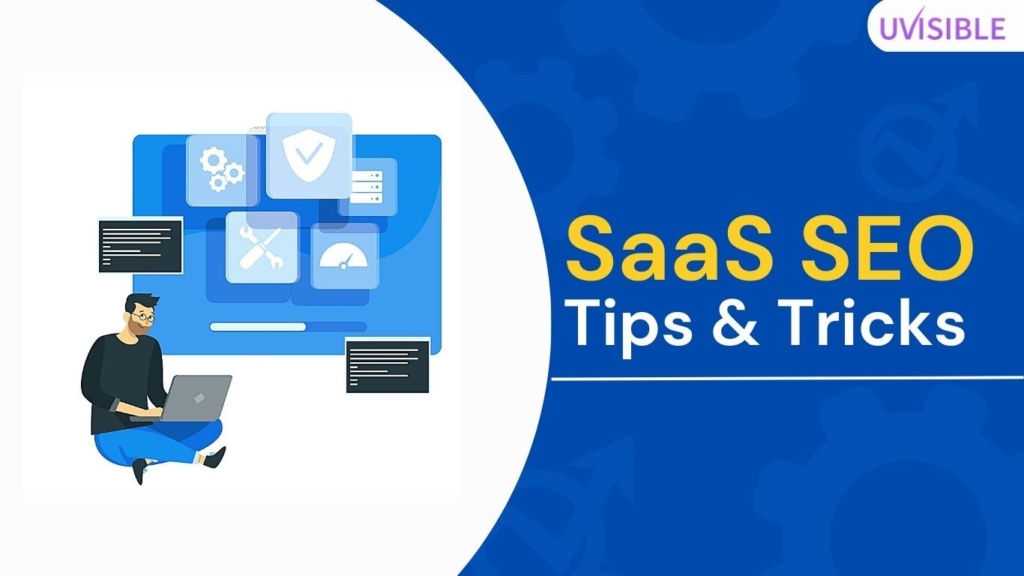
In this SaaS SEO Guide, now it’s time for some additional tips and tricks that will help you to further strengthen your SEO for SaaS strategies and get you to further accelerate your online reach.
Maximizing SaaS Visibility with Google Search Console and Analytics
Google Search Console and Google Analytics are some of the best SEO free tools that provide important information about the search engine visibility and performance of your SaaS website.
Google Search Console allows you to measure the number of impressions, clicks, and average CTR received by your web pages for various keywords.
In contrast, Google Analytics allows you to collect and analyze live data from your website.
When you connect your website to Google Analytics, you will be able to measure data such as user demographics, acquisition sources, user behavior, top pages on your site, bounce rate, average time on page, and many more.
Conversion may also be tracked using Google Analytics’ “Goals” function.
Optimize Internal Link Structure
Optimizing your internal link structure is a vital component of SaaS SEO, helping to distribute your website’s authority effectively and enabling search engines to grasp your site’s hierarchy and significance.
To address this, you can utilize tools such as Ahrefs and Link Whisper, in addition to Google’s site: search operator.
Implement a strategic approach by adding internal links from key locations, including your homepage, navigation (menu & footer), pages with the most backlinks, and relevant pages.
This will enhance your SaaS SEO strategy and improve your rankings for important keywords related to SaaS SEO.
Implement On-Page SEO Optimization
Implementing on-page SEO optimization is critical for your SaaS website’s visibility.
Even well-established brands often overlook this aspect. It’s imperative to ensure that your landing pages are meticulously keyword-optimized.
This means incorporating your main keywords and their variations into titles, H1 & H2 headings, and throughout your content.
To achieve this, following a basic on-page SEO guide is recommended.
Additionally, consider leveraging tools like Clearscope or Surfer for more advanced optimization. You can access a basic on-page SEO guide in the comments below.
By focusing on these on-page SEO techniques, you can enhance your SaaS SEO strategy and improve your rankings for keywords associated with the same.
Securing Your Brand’s Social Media Identity
SEO and other marketing channels must work together to achieve the desired outcomes.
As a result, omnichannel marketing is critical to your whole marketing approach.
Users who arrive at your SaaS website via organic search results may like to learn more about your company on social media sites. Well, it’s not a guarantee!
As a result, it is critical to have a consistent brand identity and exposure throughout all key social media networks.
According to a study, more than 60% of the global population is active on social media and typically, spends more than 2.5 hours a day using it.
You must declare your brand name on as many social media networks as possible to do this.
Monitoring Brand Mentions for Reputation Management
People will start referencing your SaaS brand or product name on websites or social media networks as your SaaS brand expands.
It is critical to keep track of these references and respond appropriately if necessary.
You may do this by utilizing tools for the same to set up brand mention notifications on Google, Facebook, Twitter, and other social media platforms.
Focus on Quality Content
Creating quality content is paramount in SaaS SEO.
Google places a significant emphasis on well-researched, valuable content.
Instead of duplicating or adding irrelevant filler, your focus should be on crafting comprehensive and genuinely helpful articles that provide value to your audience.
By adhering to this approach, you can improve your SaaS SEO strategy and enhance your rankings for SaaS-related keywords.
Quality content is not only favored by search engines but also appreciated by your readers, ultimately contributing to the success of your SaaS business.
Launch Your SEO for SaaS Strategy for Best Results
The SaaS business is thriving, as is the level of competition.
While many new SaaS companies may lean towards PPC and paid marketing channels, investing in SaaS SEO strategy early on can make a significant impact, yielding fantastic benefits in the long term.
This ultimate SaaS SEO guide contains everything you need to know and do when it comes to SEO for SaaS.
As a result, start today with Uvisible as your SaaS SEO Agency and drive more traffic, leads, and sales with our expert SEO services.
FAQs
Q1. Is SEO important for SaaS?
Yes, SEO is important for SaaS companies as it helps increase visibility, drive traffic, and improve the discoverability of their products and services, leading to increased leads, conversions, and revenue.
Q2. How important is SEO in a SaaS business?
SEO is crucial for a SaaS business as it can drive organic traffic, enhance brand visibility, and improve search engine rankings, ultimately leading to increased leads, conversions, and revenue growth.
Q3. How to create an SEO strategy for SaaS product?
To create an effective SEO strategy for a SaaS product, conduct keyword research, optimize website content and meta tags, build high-quality backlinks, use social media and other digital marketing channels to drive traffic, and continuously track and analyze performance to improve results.
Q4. What is one of the basics of a SaaS SEO strategy?
One of the basics of a SaaS SEO strategy is to conduct keyword research to identify relevant terms and phrases that potential customers are searching for and then optimize website content, meta tags, and other elements to rank highly for those terms in search engines.
Q5. How do I do SaaS Digital marketing?
To effectively do SaaS digital marketing, create a strategy that incorporates a mix of tactics such as content marketing, social media marketing, email marketing, search engine optimization, pay-per-click advertising, and influencer outreach to reach and engage target audiences, generate leads, and drive conversions.
About us and this blog
We are a digital marketing company with a focus on helping our customers achieve great results across several key areas.
Request a free quote
We offer professional SEO services that help websites increase their organic search score drastically in order to compete for the highest rankings even when it comes to highly competitive keywords.
Subscribe to our newsletter!
More from our blog
See all postsRecent Posts
- Landing Page Copy That Converts – Secrets Revealed December 16, 2024
- Understanding MTD, YTD, QTD, MoM, and YoY Metrics: A Comprehensive Guide December 12, 2024
- Learn How to Rank High on Google My Business: Guide to Master Local SEO December 7, 2024









Pingback: SEO for Small Business: Get More Traffic, Leads, and Sales - Uvisible